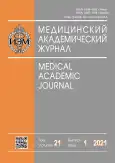Mechanisms of the influence of adiponectin on apolipoproteins A-1 and B production by human hepatocytes
- Authors: Tanyanskiy D.A.1, Dizhe E.B.1, Oleinikova G.N.1, Shavva V.S.1, Denisenko A.D.1
-
Affiliations:
- Institute of Experimental Medicine
- Issue: Vol 21, No 1 (2021)
- Pages: 39-45
- Section: Original study articles
- URL: https://bakhtiniada.ru/MAJ/article/view/62892
- DOI: https://doi.org/10.17816/MAJ62892
- ID: 62892
Cite item
Abstract
The aim of the study was to find out the mechanisms of the adiponectin effect on apolipoproteins (apo) A-1 and B production by human hepatocytes.
Materials and methods. The study was performed on the human hepatoma cell line HepG2. The expression of the apoA-1 gene was evaluated at the mRNA level by quantitative PCR with reverse transcription, and the production of apoB – by ELISA method. The activity of lipogenesis was assessed by the inclusion of labeled 14C-acetate in triglycerides, as well as by mRNA expression of lipogenesis genes, and by the estimation of total triglycerides content in cells. To determine the involvement of signaling pathways, the RNA interference method was used.
Results. Knockdown of genes, coding the specific receptors, AMP-activated protein kinase, and its regulated transcription factors inhibited adiponectin-dependent stimulation of apoA-1 gene expression in hepatocytes. Adiponectin had no effect on lipogenesis and apoB production under basal conditions, but suppressed these processes induced by the addition of oleate.
Conclusion. Adiponectin stimulates the production of apoA-1 in hepatocytes by inducing the transcription of the apoA-1 gene and suppresses the secretion of apoB by affecting lipogenesis. These effects may underlie the effect of adiponectin on lipoproteins metabolism.
Full Text
##article.viewOnOriginalSite##About the authors
Dmitriy A. Tanyanskiy
Institute of Experimental Medicine
Author for correspondence.
Email: dmitry.athero@gmail.com
ORCID iD: 0000-0002-5321-8834
SPIN-code: 9303-9445
MD, PhD (Medicine), Head of Laboratory of Lipoproteins, Department of Biochemistry
Russian Federation, Saint PetersburgElla B. Dizhe
Institute of Experimental Medicine
Email: dizhe@iem.sp.ru
ORCID iD: 0000-0001-5147-4749
SPIN-code: 1625-0496
MD, PhD (Biology), Leading Researcher, Department of Biochemistry
Russian Federation, Saint PetersburgGalina N. Oleinikova
Institute of Experimental Medicine
Email: galina@iem.sp.ru
Research Assistant, Department of Biochemistry
Russian Federation, Saint PetersburgVladimir S. Shavva
Institute of Experimental Medicine
Email: vssreinard.fox@gmail.com
SPIN-code: 5428-6800
MD, PhD (Biology), Senior Researcher, Department of Biochemistry
Russian Federation, Saint PetersburgAleksandr D. Denisenko
Institute of Experimental Medicine
Email: add@iem.sp.ru
ORCID iD: 0000-0003-1613-0654
SPIN-code: 7496-1449
MD, PhD, DSc (Medicine), Professor, Head of Department of Biochemistry
Russian Federation, Saint PetersburgReferences
- Mychka VB, Vertkin AL, Vardaev LI, et al. Experts’ consensus on the interdisciplinary approach towards the management, diagnostics, and treatment of patients with metabolic syndrome. Cardiovascular therapy and prevention. 2013;12 (6):41–81. (In Russ.)
- Denisenko AD, Tanyansky DA. Adipokines in the pathogenesis of atherosclerosis in metabolic syndrome. In: Metabolic syndrome. Ed. by A.V. Shabrov. Saint Petersburg; 2020. P. 105–139. (In Russ.)
- Yamauchi T, Kamon J, Ito Y, et al. Cloning of adiponectin receptors that mediate antidiabetic metabolic effects. Nature. 2003;423(6941):762–769. doi: 10.1038/nature01705
- Qiao L, Zou C, van der Westhuyzen DR, Shao J. Adiponectin reduces plasma triglyceride by increasing VLDL triglyceride catabolism. Diabetes. 2008;57(7):1824–1833. doi: 10.2337/db07-0435
- Matsuura F, Oku H, Koseki M, et al. Adiponectin accelerates reverse cholesterol transport by increasing high density lipoprotein assembly in the liver. Biochem Biophys Res Commun. 2007;358(4):1091–1095. doi: 10.1016/j.bbrc.2007.05.040
- Wanninger J, Liebisch G, Eisinger K, et al. Adiponectin isoforms differentially affect gene expression and the lipidome of primary human hepatocytes. Metabolites. 2014;4(2):394–407. doi: 10.3390/metabo4020394
- Wanninger J, Neumeier M, Weigert J, et al. Adiponectin-stimulated CXCL8 release in primary human hepatocytes is regulated by ERK1/ERK2, p38 MAPK, NF-kappaB, and STAT3 signaling pathways. Am J Physiol Gastrointest Liver Physiol. 2009;297(3):G611–G618. doi: 10.1152/ajpgi.90644.2008
- Shavva VS, Bogomolova AM, Nikitin AA, et al. FOXO1 and LXRα downregulate the apolipoprotein A-I gene expression during hydrogen peroxide-induced oxidative stress in HepG2 cells. Cell Stress Chaperones. 2017;22(1):123–134. doi: 10.1007/s12192-016-0749-6
- Mogilenko DA, Dizhe EB, Shavva VS, et al. Role of the nuclear receptors HNF4 alpha, PPAR alpha, and LXRs in the TNF alpha-mediated inhibition of human apolipoprotein A-I gene expression in HepG2 cells. Biochemistry. 2009;48(50):11950–11960. doi: 10.1021/bi9015742
- Nekrasova EV, Danko KV, Shavva VS, et al. Effect of the insulin on the apolipoprotein A-I gene expression in human macrophages. Medical Academic Journal. 2020;20(1):65–74. (In Russ.). doi: 10.17816/MAJ16437
- Lee J, Hong SW, Park SE, et al. AMP-activated protein kinase suppresses the expression of LXR/SREBP-1 signaling-induced ANGPTL8 in HepG2 cells. Mol Cell Endocrinol. 2015;414:148–155. doi: 10.1016/j.mce.2015.07.031
- Hwahng SH, Ki SH, Bae EJ, et al. Role of adenosine monophosphate-activated protein kinase-p70 ribosomal S6 kinase-1 pathway in repression of liver X receptor-alpha-dependent lipogenic gene induction and hepatic steatosis by a novel class of dithiolethiones. Hepatology. 2009;49(6):1913–1925. doi: 10.1002/hep.22887
- Fazio S, Linton MF. Regulation and clearance of apolipoprotein B-containing lipoproteins. In: Clinical lipidology: a companion to Braunwald’s heart disease. Ed by C.M. Ballantyne. 2nd ed. Sauders Elsevier; 2015: 11–24. doi: 10.1016/B978-141605469-6.50006-8
- Awazawa M, Ueki K, Inabe K, et al. Adiponectin suppresses hepatic SREBP1c expression in an AdipoR1/LKB1/AMPK dependent pathway. Biochem Biophys Res Commun. 2009;382(1):51–56. doi: 10.1016/j.bbrc.2009.02.131
- Chen H, Zhang L, Li X, et al. Adiponectin activates the AMPK signaling pathway to regulate lipid metabolism in bovine hepatocytes. J Steroid Biochem Mol Biol. 2013;138:445–454. doi: 10.1016/j.jsbmb.2013.08.013
- Garcia D, Shaw RJ. AMPK: Mechanisms of cellular energy sensing and restoration of metabolic balance. Mol Cell. 2017;66(6):789–800. doi: 10.1016/j.molcel.2017.05.032
- Iwabu M, Yamauchi T, Okada-Iwabu M, et al. Adiponectin and AdipoR1 regulate PGC-1alpha and mitochondria by Ca(2+) and AMPK/SIRT1. Nature. 2010;464(7293):1313–1319. doi: 10.1038/nature08991
Supplementary files







